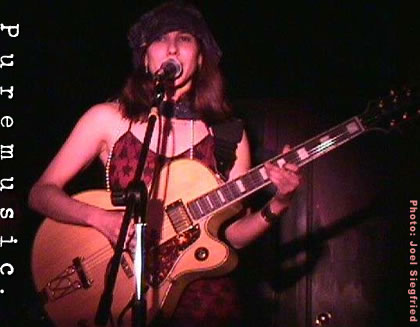
A Conversation
with Joy Eden Harrison (continued)
PM: So after that was done, then you drifted to Europe. It's a wonderful progression of things, really.
JEH: Yeah.
PM: Where, in particular?
JEH: I spent most of the time in Florence.
PM: Ah.
JEH: My boyfriend at the time was a painter, and he was studying it at an atelier in Florence. And I went there and did music. And then also in Germany, I was in Germany and Paris.
PM: Wow. Having spent some time in Germany myself, I wonder where you were hanging out there?
JEH: In and around Kassel, in a region called Hessen.
PM: Certainly. But part of your European experience, at least by the bio, is "Painter's model by day and street bard at night."
[laughter]
PM: I mean, it sounds literally like someone from another time.
JEH: Wow. Well, in a way, being a model in Europe was just fabulous. You get sort of adopted by the studio that you're working in, and part of an artistic community. And it was quite fluid and integrative, the music and art and the discussion of them. In Europe, art and music felt like they were important standing all by themselves. In America, it always felt like the value of art or music was how much you got paid for it. If you were successful--the more successful you were, the more you got paid. In Europe you had a feeling that it didn't matter about getting paid, it was about enriching lives.
PM: Right. And I think it's still like that. I think that difference still exists in Europe today.
JEH: Yeah, absolutely.
PM: Which is kind of astonishing in this acquisitive, materialistic and technological age.
JEH: Yeah, I would agree, definitely.
PM: But it certainly is rarely to be found in American culture.
JEH: Exactly. And that's why it takes a brave artist--and there are thousands of brave--probably hundreds of thousands of brave artists in this country who are still living by that even though the culture isn't giving them much recognition for it.
PM: And in fact, it's giving them less and less.
JEH: Right.
PM: The artists who do get attention are the very corporate, what seem to many of us as more disposable types, since they come and go with great speed. And the people who are trying to do something lasting and important fall prey, not only to that kind of thinking, but also the rise of video, of gaming, of computers, and all these other things that are literally capturing the attention, for better or for worse, of the American public. The global public, really.
JEH: Absolutely. Something I tried to take back with me and keep, from Europe, was the importance of artist community, that it's very important to support each other's work. For example, in Chicago I'm part of a group of artists, a painter and a photographer and a performance artist type cellist that meet regularly and keep the discussion going. And audiences are there. They're relatively small, but they still deserve the music to come out to. There's still a place for it. It's just not where the money is.
PM: Where do you like to gig in Chicago? Is there a place that you like to play?
JEH: Well, I have to say I'm not gigging in Chicago right now, that I've taken a hiatus. The places that I loved to place were Shuba's and Pops For Champagne.
PM: Yeah.
JEH: Those are nice places. And it would be a thrill to play at the Green Mill where I first saw Patricia Barber, it's just a wonderful venue.
PM: Yeah, I've heard that's an amazing venue.
JEH: But I've taken a hiatus for the past two and a half years. And now--well, I guess that leads to the album coming out.
PM: Yeah. I'm almost there. Actually, we should get there, because I'm so curious about all who you are, that I'll go on indefinitely, because I'm just one of those Joy Eden Harrison fans, you know. continue
print (pdf) listen to clips puremusic home